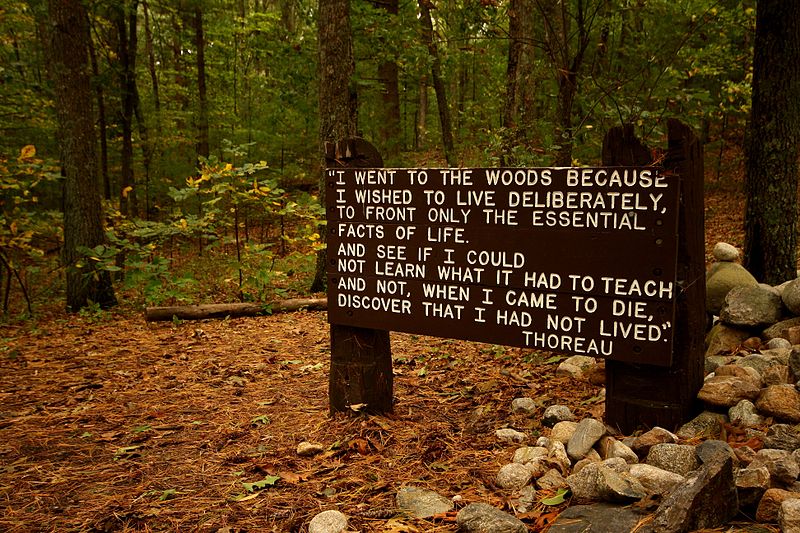Revisiting Henry David Thoreau’s Walden in the era of smart-cities
The New Leam wants its readers to see this convergence of ideas, and reflect on our destiny—the way our denaturalized existence with its culture of gadgets, mindless speed, breaking news, soap operas, media spectacles and market-driven simulation has caused a new form of social control, and made us incapable of realizing our true selves, our inner rhythm, our silence and solitude. Is it possible for us to bring these tales of wisdom to the younger generation?
Kabir / The New Leam
The mantra of contemporary India is perhaps ‘development by hook or by crook’ that is why in recent times the word ‘development’ has become not only the most frequently used but also the one most frequently abused. In all political campaigns, in policy advertisements and as part of the parochial myth of growth, success and lifestyle the magical spell chanted by the agenda of ‘development’ has seduced the national consciousness and robbed it of its intelligence or critical reflection.
We seem to be caught in a collective state of inertia that does not allow us to look beyond the glamour and glitz of the neo-liberal market, its fetish for excessive consumption seems to us like a promise for a better life, its logic of having is being has engulfed us completely and we find ourselves on a fatal road where greed becomes need and returning is impossible. Visit a mall over the weekend and you would discover the crowd engaged in consumption of commodities and services, purchasing- gratifying and again returning for more- the endless urge to earn, spend and earn finds us entrapped in the vicious cycle of the market and gradually becomes so engrained in us that we tend to feel that if we miss an offer, do not utilize a sale, do not attend a store launch, miss a discount or do not buy the latest techno-gadgets we will become backdated if not backward.

My phone, my car, my branded attire all become the defining traits of who I am as an individual and thus to not ‘purchase’ or ‘consume’ is equated with ‘not being’ of any worth.
Reading this article many of the readers will first react with opposition and remind me that technology and development are intrinsic to modern existence and denying them space in our lives will perpetually bind us to socio-cultural backwardness. But let me request them to take a simple challenge and ask themselves a few questions, can they live comfortably without their mobile phone for even an hour in a day? When was the last time that they immersed themselves in nature without trying to click a photograph for the social networking site or when was the last time that they engaged in a long conversation with someone without checking their mobiles for new messages?
The idea that I am trying to bring forth here is that although man discovered technology to work for him, today technology often dictates how we live our lives. It is difficult to accept this today because we are all intoxicated by the wine of modernity but the time shall soon come when we learn to discover ourselves beyond it and as independent of it. Food, shopping, products, malls, smart-cities and high packages paint an apparent picture of growth but have we wondered why we are never satisfied, why despite entire closets full of branded clothes we still wish only to buy more or why burgers and pizzas never quench our internal thirst? As humans were we created only to sell and purchase or to remain only economic beings or is there anything more to our being, something more subtle and nuanced?

It is at this juncture that I am reminded of Henry David Thoreau’s remarkable experiment. Born in America Thoreau at the age of twenty eight decided to walk away from what he saw as the country’s materialism and sought to live a life of peace and solitude in a country cabin near Walden Pond. Thoreau in his famous book Walden wrote
I did not wish to live what was not life, living is so dear; nor did I wish to practise resignation, unless it was quite necessary. I wanted to live deep and suck the marrow out of life, to live so sturdily and Spartan-like as to put to rout all that was not life, to cut a broad swath and shave close, to drive life into a corner, and reduce it to its lowest terms, and, if it proved to be mean, why then to get the whole and genuine meanness of it, and publish its meanness to the world; Or if it were sublime, to know it by experience, and be able to give a true account of it in my next excursion.
Thoreau’s urge to leave the madness of a materialist civilization and to enter into a secluded life in the quiet forest must have even in his own time prompted severe criticism and ridicule. But look at the intuitive strength of the man who had the calibre in him to leave behind the luxuries of the materialistic life and live to discover the inner self amidst the forest pond. Thoreau also went on to have a great impact on the mind of Gandhi, who was also a staunch critique of the modernist discourse of development with its hegemonic meta narrative. It is a paradox of our intellect that when we read about minds such as Thoreau and Gandhi or of their experiments towards simple living we find it hard to resist the urge for over simplification and a shallow understanding.
As a reader, as thinking mind when I engage with these classic works let me have the strength to unite with them in their deeper intentions before judging them on the paths that they adopted as those can be negotiated but let me have the maturity to look at the world from their eyes before discarding them as irrelevant. Let me have the strength to find Thoreau’s remarkable insights as I walk through the smart-city…
The New Leam has no external source of funding. For retaining its uniqueness, its high quality, its distinctive philosophy we wish to reduce the degree of dependence on corporate funding. We believe that if individuals like you come forward and SUPPORT THIS ENDEAVOR can make the magazine self-reliant in a very innovative way.













